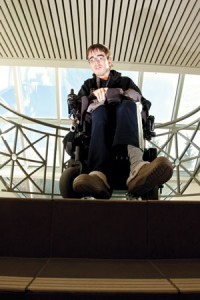Disabled but still able
by Bryan Weismiller

Joe Waring, who has Cerebral Palsy, said people shouldn't just assume that he needs help just because of his disability.
Joe Waring could be worried about anything, but he’s only concerned with getting a free Booster Juice at the moment. Despite having Cerebral Palsy and requiring a wheelchair, Waring seems more frustrated that he can’t persuade his mother, Veronica Waring, to buy him a smoothie. “Come on, that’s not fair. This is discrimination,” he jokes.
Waring pleads his case as we move through Wyckham House, but his mother doesn’t give in. “You’ve got money, if you really want one then you can go buy it yourself,” she says. It’s a lighthearted conversa- tion that could be heard anywhere, which is exactly why Waring likes it. Imagine a world where being unable to walk wasn’t even the most aggra- vating part of your day. He’s struggled with receiving special treatment for 20 years and it’s a relief for him to be treated like most people his age.
Waring lives with his disability, but it’s much tougher for him to deal with people’s ignorant assumptions about his situation. “It makes me laugh that people assume, because I drive around on four wheels (as) opposed to walking around on two legs, that I have some sort of bigger problem than I really do.”
Waring doesn’t like it when people assume that he needs help with something and intervene, without actually asking him if he needed a hand first. “A lot of people just assume that I can’t do things before they ask if I need help. Ninety per cent of the time if you ask then I’ll say I need help, but if you don’t ask then I’m going to get pissed. That’s belittling to me, you’re just assuming that I can’t do it.
“You’re not going to be there the next time that I need to do the exact same daily task, so I need to learn how to do it myself.” Waring is currently taking disability studies at Mount Royal University and he hopes to one day teach disabled students. Waring couldn’t cook or shower by himself until he moved into one of Mount Roy- al’s residences. Since then, he’s become self-reliant with the help of his friends who’ve pushed him along and shown him how to do things. One of Waring’s good friends is his roommate, Chris Pals. Pals moved into residence at the beginning of October and he already admires his roommate.
“It’s astonishing how much he does for himself and how committed he is to being self- reliant,” Pals says. “It’s amazing to see how much he does on his own and yet I don’t think people give him the credit that he deserves for what he really does.”
Pals has his own perspective on what it’s like to have limited mobility. Last month, he spent 48 hours in a wheelchair to see what it’d be like. “We as ‘uprights’ take the fact that we can walk for granted on an everyday basis,” Pals says. “When you have that ability revoked for 48 hours then it reminds you how dependent you are on something that you do unconsciously. “It’s like breathing, if someone took away your air then you’d realize that it’s something that’s really, really important.”
Pals admitted that he didn’t always give Waring enough credit until he actually spent time living like he had a disability. He quickly found out that everything was more challenging, including the first time he attempted to use the washroom. “I’ve seen Waring do it really quickly, so I figured I could,” says Pals. “I caught my shoe, fell over, cracked my shoulder blade on the side of the toilet. It was hilarious. “I’m laying on the ground reminding myself that I can’t just stand up. It was very eye- opening.”
Charlotte Rose, a Mount Royal student and residence advisor, says that she was proud of Pals for sticking with it, even during the tough times. “I was very proud of Chris for spending 48 hours in a wheelchair without any exceptions of movement and following through,” Rose says. “I also thought it was really great how he took the whole experience in.
“He came and talked to me and described how people treated him differently and how he didn’t like it.” Rose says she hopes to run a program for her students to get a similar experience and that she’s going to share that idea with other residence advisors. The program would give students a better understanding of what it’s like to be disabled, so they can better relate to students like Waring.
“Waring is an individual who does not let his disability get in the way,” says Rose. “If you take pity on him, he reminds you that he is human and fully capable of doing anything that you can do.”



